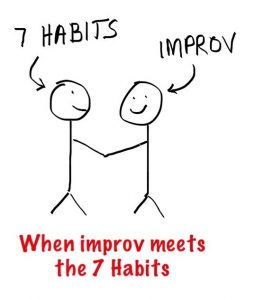Did you know that improv training can help employees in a business environment?
I was surprised when my guest on Thursday’s Stand Up & Speak Up radio show, Viet Hoang, pointed out a specific connection between the first principle of improv, listening, and the 5th habit in Steven Covey’s the 7 Habits of Highly Effective People, which is Seek First to Understand, Then to Be Understood. Surprised that I did not see this connection sooner. Although I taught several 7 Habits classes at Raytheon and I studied improv, I somehow missed the connection.
After the show, I investigated this connection more, to help me both as an improv student and to Teach to Learn.
Habit 5 is based on the concept of making sure we listen first before trying to explain ourselves. And to use a specific listening technique called empathic listening, which involves understanding both the content of what is said as well as the intent of the person talking and paying attention to the circumstances at the time the words are spoken.
A lot of us want to get our point across and seek first to be understood. This is ineffective, because when we do, we may ignore the other person completely while pretending that we’re listening. Which means we only hear parts of the conversation or focus on only the words but miss the meaning.
So how does improv help? The first principle of improv is listening. Listening and then responding to what is said. But it is more then just listening to the words that are being said, there is also “listening” to the physical communication, the emotions, and the intent.
93% of communication is non-verbal, so it is extremely important to pay attention to what the person is saying with their physicality — how they are standing, their facial expression, their mannerisms and their movement.
Everything said has emotion behind it and we should listen with the intent of understanding what that emotion is.
Finally, we should listen for what is the intention of the other character or performer. The intention of the performer is often different from the intention of the character. That is the character may say one thing but may one you to do the opposite.
Thanks, Viet, for pointing out this connection. Whether at work or at home or in an improv scene, empathically listen to what your partner says or doesn’t say, and the way they say it. Each word, gesture or pause provides a lot of information. You will be a much more effective employee, be more effective in your relationships, and be a better improvisor.


